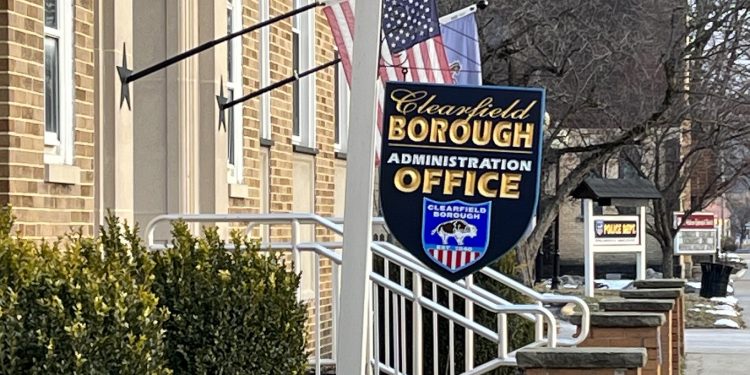CLEARFIELD – Clearfield Borough will not be supporting a whitewater project on the West Branch of the Susquehanna River.
At Thursday’s meeting, the Clearfield Borough Council voted 5-0 to approve a motion to discontinue pursuing an agreement with the Clearfield Revitalization Corp. regarding the whitewater project.
The council also approved an amendment to the motion to include “and not enter into any agreement with Clearly Ahead Development to remove the R. Dudley Tonkin Memorial Raftmen’s Timber Dam.”
Council members Steve Livergood, Barb Shaffner, Ann Jane Ross, Todd Orsich and George DeHaven voted in favor of the motion. Council members Stephanie Tarbay, and Tristen Buck were not present at the meeting.
Livergood, the council president, called the meeting to order, then announced that the council would proceed directly to the public works committee items, before retuning to the normal order of the meeting’s agenda.
The council approved motions to advertise for the planning committee reorganization meeting and to run advertising in the first part of January with a list of meeting times for 2025 and the motion regarding the whitewater project.
According to previously-published GANT News articles, the project would involve removing two low-head dams, one at Pee Wee’s Nest by Irvin Park in Curwensville and the Raftsmen’s Dam by J.G. Food Warehouse in Clearfield and replacing them with man-made whitewater recreation features.
The council then moved to the public comment section of the meeting.
Six residents spoke in opposition of the project, citing reasons such as inability to maintain the necessary water levels for the project, damaging the natural beauty of the river, the removal of the R. Dudley Tonkin Memorial Raftsman’s Timber Dam, as well as the projects impacts on fishing and recreation.
Some cited engineering studies that showed that removing the dam would lower the depth of the river.
Others encouraged the council to “Google” how many of these projects have been constructed, spending hundreds of thousands of dollars, only to fail.
Resident Jarret Forcey spoke in favor of the project. Forcey said the project was “one of our final opportunities to show our youth and our citizens in our town that Clearfield is willing to adapt and to try new things to keep our youth here.”
He said since the last council meeting, he has heard a lot of different opinions from people of all ages and walks of life.
Forcey said the common theme among people he spoke with was that the project would never get “off the ground” not because it wasn’t wanted or was a bad idea, but “because nothing ever changes in Clearfield.”
Forcey mentioned the fact that many of the young people will graduate high school, go on to higher educating or trade school and move to out of the area, due to lack of opportunities both for employment and a lack of activities.
He said the project could provide economic opportunities through recreation and tourism.
Resident Steve Bennett asked if the motion the council had passed meant the borough’s part in the project was over. Livergood responded yes.
Resident Christy Fulton questioned the council’s executive session at last week’s work session/committee meetings and the vote following the executive session/closed meeting to recommend discontinuing the agreement with CRC.
Fulton said she was also concerned with the council’s decision to amend the motion as written in Thursday’s agenda.
Fulton said if the council did not act within the scope of the Pennsylvania’s Opening Meetings Laws, commonly referred to as the “Sunshine Act,” it could provide grounds to challenge the council’s vote.
According to the Pennsylvania Office for Open Records, on Aug. 29, 2021, Senate Bill 554 amended the Pennsylvania Sunshine Act to include the requirement that agencies post the agenda for all public meetings at least 24 hours in advance. The agenda requirement applies to all regular and Special public meetings, but does not include work sessions, conferences and executive sessions, where official action is not permitted.
The agenda should include all issues to be deliberated on and any planned official action, such as votes.
An agency can change the agenda within the 24-hour threshold, provided the changes are de minimus, involve no expenditure of funds, and don’t entail entering into a contract.
The reason for the change must be announced prior to any official action, including a vote, the amended agenda must be posted within 24 hours after the meeting, and the meeting minutes must reflect that the change was made.
According to the PA OOR, an agency may enter into an executive session/closed meeting under the following criteria: discussing personnel matters; information, strategy and negotiation sessions related to the negotiation of a collective bargaining agreement; the purchase or lease of real property; consulting with an attorney about active or pending litigation; discussing agency business which, if conducted in public, would violate a lawful privilege or lead to the disclosure of information or confidentiality protected by law; certain academic matters (this reason is specifically limited to certain institutions of higher education); and discussing certain public safety issues if disclosure of the information discussed would be reasonably likely to jeopardize or threaten public safety or preparedness or public protection.
Further, agencies are required to give a “meaningful” reason for entering into an executive session/closed meeting.
The reason stated must be of sufficient specificity to inform those present that there is a specific, discrete matter or area which the board determined should be discussed in executive session/closed meeting.



